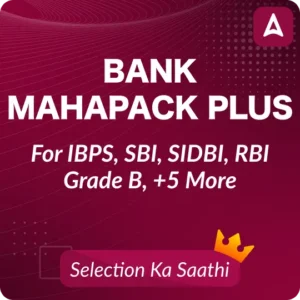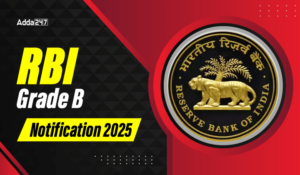Table of Contents
Every year, Central Bank Credit Officer exam preparation requires candidates to develop a well-structured study plan and preparation strategy to excel in the competitive banking sector. Let us focus on the exam pattern and effective preparation strategies to help candidates succeed in the Central Bank Credit Officer recruitment process. In this article we have focused on how to prepare for Central Bank Credit Officer 2025?
How to Prepare for Central Bank Credit Officer 2025?
Success in the Central Bank Credit Officer 2025 exam requires a strategic and disciplined approach. By understanding the exam pattern, setting realistic goals, using previous year question papers and keeping up with banking current affairs, candidates can maximize their chances of securing the post. With consistent practice, effective time management and a focus on revision, candidates can confidently approach the exam and achieve their career goals in the banking sector.
Creating a Study Plan and Assessing Your Preparation
The first step in preparing for the exam is evaluating your current knowledge and identifying strengths and weaknesses. Assess which subjects require more attention and allocate additional time accordingly. A balanced approach ensures that while working on weaker areas, you also maintain proficiency in strong subjects.
Understanding the Exam Pattern and Syllabus
A thorough understanding of the exam pattern and syllabus is crucial for prioritizing topics based on their importance. Knowing the weightage of each section will help candidates focus on high-scoring areas while efficiently managing time.
Setting Clear and Achievable Goals
Candidates should define both short-term and long-term goals to track their progress effectively.
- Short-term Goals: Set daily or weekly targets to cover specific portions of the syllabus.
- Long-term Goals: Establish overall objectives for the entire exam preparation process to stay motivated.
Following the SMART (Specific, Measurable, Achievable, Relevant, and Time-bound) goal-setting framework will help ensure a structured approach.
Breaking Down the Syllabus and Prioritizing Topics
Dividing the syllabus into smaller, manageable sections makes preparation more organized. Prioritize topics based on difficulty level and their weightage in the exam. Start with high-yield topics like credit management, non-performing assets (NPAs), Basel norms, and financial statements before moving on to lesser-weighted areas.
Creating a Study Schedule with Effective Techniques
A well-planned study schedule is essential to cover the syllabus efficiently. Allocate dedicated time slots for each section and incorporate active learning techniques, such as summarizing concepts, engaging in discussions, and teaching topics to others. Using spaced repetition will enhance long-term retention and comprehension.
Practicing with Mock Tests and Tracking Progress
Taking regular practice tests is key to assessing your knowledge, identifying weak areas, and improving time management. Conduct self-assessments periodically and adjust your study plan accordingly. Maintaining a ‘Mistake Log’ will help track errors and ensure continuous improvement.
Making Short Notes for Quick Revision
Creating concise notes for key topics like credit policies, financial regulations, and RBI guidelines aids in quick revision. Maintain a one-page summary for each major topic and update it regularly. Keeping a separate notebook for banking updates and RBI policies will also be beneficial.
Utilizing Previous Year’s Papers
Analyzing previous year’s question papers is one of the best ways to understand the exam pattern, frequently asked topics, and difficulty level. Action Plan:
- Collect 5–10 years of past papers and organize them by topic.
- Identify recurring themes in professional knowledge, banking awareness, and reasoning.
- Focus on high-weightage areas and allocate more time to them.
- Take full-length mock tests to build exam-day confidence.
- Maintain a record of mistakes and review them regularly.
Staying Updated with Banking Current Affairs
Developing a habit of staying informed about banking news is crucial. Dedicate 10-15 minutes daily to skimming through top headlines related to RBI policies, government schemes, and banking regulations. Use newsletters or mobile apps for quick updates rather than lengthy articles.
Building a Strong Foundation in Core Subjects
A solid grasp of financial principles, credit analysis, and risk management is essential. Candidates should focus on fundamental topics such as financial statements, monetary policy, and banking operations. Logical reasoning and data interpretation should also be practiced regularly.
Preparing for the Descriptive Section
Writing essays and formal letters is an important component of the exam. Tips for Success:
- Letter Writing: Focus on formal formats like job applications, complaints, and official correspondence.
- Essay Writing: Practice structuring essays with a clear introduction, body, and conclusion on topics related to banking, economy, and current affairs.
- Grammar and Clarity: Ensure proper sentence structure, coherence, and clarity in writing.
- Timed Practice: Develop the habit of writing under time constraints to improve efficiency.
Effective Time Management Strategies
Time management plays a crucial role in the exam. To optimize efficiency:
- Practice timed mock tests to enhance speed and accuracy.
- Prioritize easier questions first and tackle more challenging ones later.
- Use the elimination method for multiple-choice questions to improve accuracy.
- Regularly assess progress and adjust study plans accordingly.
| Related Posts | |
| Central Bank Credit Officer Salary | Central Bank Credit Officer Cut off |





 GA Capsule for SBI Clerk Mains 2025, Dow...
GA Capsule for SBI Clerk Mains 2025, Dow...
 The Hindu Review October 2022: Download ...
The Hindu Review October 2022: Download ...
 RBI Grade B 2025 Notification, Selection...
RBI Grade B 2025 Notification, Selection...


